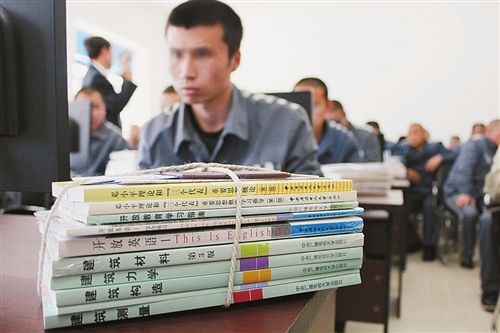
The classroom building is sparklingly clean, and inside a teacher enthusiastically lectures and students listen attentively. The uniform prison suits that the students have on are the only reminder that this is a prison enclosed by high walls.

At 9 AM on May 15th, the bright sun shines on the classroom building of Daqing Prison. After the opening ceremony of the first “Daqing Prison Class of Daqing Radio and TV University”, 43 prisoners of Daqing Prison officially become students of the first prison class of Daqing Radio and TV University (RTVU).
In the computer room, they carefully enter their names and student IDs into their computers as the teacher directed...
First Student Recruit Imprisoned as a Sophomore
A young man nearly 180 centimeters tall, 27-year-old Tang wears glasses and likes to touch his nose with his thumb when smiling. Tang was the first student to enroll in the prison class. A prison officer said, “He had been an undergraduate at a university in our city, but he was imprisoned before finishing his study due to robbing the bank with a brick.”
“I studied at a university for two years, but I only have a senior high school degree. As such, nobody would hire me in the future. I planned to continue my studies after I leave here, but now I have the chance to study while serving my sentence,” says Tang carrying a bundle of books.
“Picking up a textbook again reminds me of the good old days at the university, of my old classmates... I really regret what I did. When the RTVU class opened in prison, I became the first applicant and I chose finance as my major.”
900 Yuan to Study Two and a Half Years for a Junior College Diploma
“Everyone, please log on to the Daqing RTVU online platform and enter your name and student ID.” During the first class, Director Liang Wenchao of the RTVU Distance Education Division explains the study guidelines for open education and gives each student the textbooks for his major and an RTVU student ID card.
In class, we learn that the prison class is conducted via open and distance education for two and a half years. If the students take the examinations at the end of each term and obtain the required credits, they can get junior college diplomas from China Central Radio and TV University upon graduation.
The RTVU waives half of the tuition fee for the inmates, and Daqing prison pays one quarter of the tuition. As a result, they only need to pay 900 yuan for two and a half years of study to get a nationally recognized junior college diploma.
Some students will return to the outside world in less than one year. Daqing RTVU President Liu Pengbin says, “It’s no problem for them to continue RTVU study back on the outside until they graduate and get their diplomas.”
After the first class, a 39-year-old inmate surnamed Zhang carefully examines the textbooks of other students and says, “Before, I thought there was no point in studying. After this class, I think it’s very interesting. I still have dozens of years to go, and I’d like to take the chance to learn something like the appraisal of second-hand vehicles. As such I can prepare for life outside. I am definitely going to enroll for the autumn class.”
Inmates Go to College in Prison, the Province Benefits
The prison class is off to a good start. How can Daqing RTVU teachers continue to conduct classes with the prisoners behind high walls?
Liu Pengbin replies by explaining that the RTVU will use the new educational model of distance education to conduct higher degree education for special groups. Based on practical circumstances, the first prison class offers junior college programmes for 8 majors: accounting, business administration, finance, administrative management, automotive technology, property management, logistics and construction. The RTVU seeks “to turn the prison into a school and the prison term into a school term.”
Teaching management will follow the “1334” model. “1” stands for students’ autonomous learning via local area network (abbreviated as one autonomy). The first “3” stands for the teachers’ role in guiding, assisting and promoting learning (three learnings). The second “3” stands for education that combines centralized face-to-face tutorial, group discussion and personalized autonomous learning (three combinations). “4” stands for the involvement of discipline cadres, prison officers, RTVU administrators and tutors in conducting learning activities (four involvements).
“The opening of junior college education to inmates has filled the gap of college education for prisoners serving their sentences in the province. These people are around 30 years old, and it’s our hope that through study they can return to society with junior college diplomas. A skill can keep them away from crime, and this represents a rethinking of prison management,” says Wang Yongxiang, warden of Daqing Prison.
By Shao Yuting